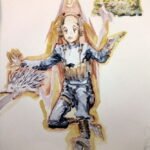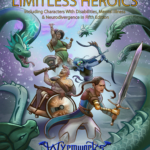Aderyn Lloyd

Medium Humanoid (Half-Elf), Chaotic Good
Non-binary, They/ThemArmor Class: 18
Hit Points: 73
Speed: 30 ft.
Strength Dexterity Constitution Intelligence Wisdom Charisma 16 (+3) 20 (+5) 14 (+2) 14 (+2) 16 (+3) 12 (+1) Skills: Acrobatics +13, Athletics +11, Deception +5, Investigation +6, Perception +7, Sleight of Hand +9, Stealth +13, Survival +7
Senses: Darkvision 60 ft., Passive Perception 17
Languages: Common, Deep Speech, Elvish, Thieves’ Cant
Challenge: 10Abilities
Cunning Action. Their quick thinking and agility allow them to move and act quickly. They can take a bonus action on each of their turns in combat. This action can be used only to take the Dash, Disengage, or Hide action.
Fast Hands. They can use the bonus action granted by their Cunning Action to make a Dexterity (Sleight of Hand) check, use their thieves' tools to disarm a trap or open a lock, or take the Use an Object action.
Second-Story Work. They can climb faster than normal; climbing no longer costs them extra movement. In addition, when they make a running jump, the distance they cover increases by a number of feet equal to their Dexterity modifier.
Sneak Attack. They know how to strike subtly and exploit a foe's distraction. Once per turn, they can deal an extra 5d6 damage to one creature they hit with an attack if they have advantage on the attack roll. The attack must use a finesse or a ranged weapon. They don't need advantage on the attack roll if another enemy of the target is within 5 feet of it, that enemy isn't incapacitated, and they don't have disadvantage on the attack roll.
Supreme Sneak. They have advantage on a Dexterity (Stealth) check if they move no more than half their speed on the same turn.
Uncanny Dodge. When an attacker that they can see hits them with an attack, they can use their reaction to halve the attack's damage against them.
Actions
Dagger +1. Melee Weapon Attack: +10 to hit, 5 ft., one target. Hit: 8 (1d4 + 6) piercing damage.
Rapier of Wounding. Melee Weapon Attack: +9, 5 ft., one target. Hit: 9 (1d8 + 5) piercing damage, 2 (1d4) necrotic damage.
Traits
Agnosia (Humanoid/Faces) [IE 1, Triggered by overstimulation and fatigue]. Disadvantage and −1 penalty to recognizing and remembering facial features
Attention Difference [IE 2, Frequent]. When performing a mundane task, Aderyn must make a DC 10 Wisdom saving throw. On a failure, they become distracted and have disadvantage on related skill checks and have a +2 bonus to Wisdom (Perception) checks. On a success, they have advantage on all related skill checks and a −2 penalty to Wisdom (Perception) checks.
Diminished Motivation [IE 2, Periodic]. To begin a task, they must make a DC 10 Wisdom check. They may reattempt every 2d4 minutes.
Eating Disruption (Anorexia) [IE 1, Frequent]. When it’s time to eat, Aderyn must make a DC 12 Wisdom saving throw or be unable to force themself to eat. On a success, they can eat and must succeed on a DC 9 Constitution saving throw or experience Baseless Emotion (Guilt) or (Panic) until they succeed on the saving throw which they may reattempt every 10 minutes.
Executive Functioning [IE 2, Frequent]. −2 penalty to all initiative rolls and on a roll of 1 or less, Aderyn cannot use their bonus actions the first round. On any attempt to find something they previously owned, they have a −2 penalty to Wisdom (Perception) checks to find it. They have a −2 penalty to all reaction rolls.
Eye Color Difference (Sclera). −1 Charisma (Persuasion) checks, +1 Charisma (Intimidation) checks
Fatigue [IE 2, Chronic]. Every long rest, Aderyn must make a DC 14 Constitution saving throw or take 1 level of exhaustion during the duration. They must also make a DC 10 Constitution saving throw or experience insomnia and get no benefits from a long rest.
Hand Hypersensitivity [IE 2, Periodic]. +2 Wisdom (Perception) checks involving touch, cannot wear hand coverings without extreme discomfort
Hand Tremor [IE 1, Periodic and Triggered by Phobias]. −1 penalty to all Strength and Dexterity checks that require fine motor control
Leg Pain [IE 4, Chronic]. All Concentration checks, DC 14 Constitution saving throw per round to maintain concentration. Any round Aderyn uses their legs, must make a DC 16 Constitution saving throw or experience one level of exhaustion, cumulative each round of exertion requiring 5d20 x 4 per level of exhaustion rounds to recover afterward. They have a +4 bonus to saving throws against psychic damage.
Leg Weakness [IE 1, Periodic]. Movement speed reduced by 25 percent without assistance. Consider the Strength attribute to be 3 less for all Strength checks involving leg strength. Every round spent standing requires a successful DC 9 Constitution check, the DC increasing by +1 each round. Failure results in immediately needing to sit or be prone.
Phobia (Acrophobia/Arachnophobia/Trypanophobia) [IE 1, Triggered]. When within 10 ft. of the phobic stimuli Aderyn, must make a DC 9 Wisdom check or have a −1 penalty to all Intelligence, Wisdom, and Charisma ability checks.
Repetitive Movement [IE 3, Frequent]. For 3d4 rounds, Aderyn uses stimming to manage their emotions. When attempting to or unable to stim, Aderyn must make a DC 6 Constitution check to fight the urge each round with the DC increasing by 3 each round until the stimming behavior is engaged in. Failure to resist results in a −3 penalty to all ability checks until their stimming needs are met.
Sensory Processing Difference (Over-Responsivity/Auditory) [IE 4, Chronic]. When the stimulus is present, Aderyn must make a DC 12 Constitution check or act to avoid the stimulus however possible. Aderyn can attempt to remake this check each round. While avoiding, they take a −4 penalty to all Constitution checks and a +4 bonus to all Wisdom (Perception) checks involving hearing.
Sensory Processing Difference (Sensory Craving/Proprioception/Touch) [IE 4, Chronic]. When faced with these sensations, Aderyn must make a DC 12 Wisdom check to resist indulging in that stimulation, regardless of the consequences. This goes on each round the stimuli are present with the DC of the check increasing each round. While indulging, they have −4 on all Wisdom (Perception) and initiative rolls.
Sensory Processing Difference (Under-Responsivity/Touch/Pressure) [IE 4, Chronic]. −4 penalty to Wisdom (Perception) rolls related to this stimulus. A −4 penalty to all Dexterity checks and +4 bonus to all rolls to resist pain or torture with resistance to psychic damage.
Social Interaction Difference [IE 3, Chronic]. They have trouble interpreting the social aspects of language, both verbal and non-verbal, and the feelings being conveyed. This can make them seem insensitive as they miss sarcasm, avoid eye contact, take expressions literally, or don’t attend to the subject as neurotypical people would expect, or they tend to repeat phrases spoken to them as they process them. They have a −3 penalty on Charisma (Persuasion) and Charisma (Deception) and Wisdom (Insight) checks. They can use Masking to mitigate these effects.
Lower Body Stiffness [IE 2, Periodic]. Their hips and knees are difficult or impossible to move without extreme pain. They have a −2 penalty on any action that would use those joints, including attack rolls. Their daily walking distance is reduced by 40 percent.
Assistive Devices
Wondrous Item, uncommon
These magic axles can be adjusted and installed on nearly any wheelchair by someone with smith's tools or carpenter's tools. Once installed, these axles have 3 charges. While sitting in the wheelchair, you can expend 1 charge as a reaction to dodge without using your action. The axles regain all expended charges daily after a long rest.
Wondrous Item, uncommon
Usually chainmail but sometimes found in other configurations, this armor has 8 charges. While wearing it, you can expend 1 charge as a bonus action to cause the armor to constrict such that it applies deep pressure and a sense of calmness, like a hug, usually pleasurable for those that find hugs overwhelming. If you have Phobia (Claustrophobia), this armor will trigger it. The armor regains 2d4 expended charges daily after a long rest.
Wondrous Item, uncommon
This fidget has 3 charges and functions as both a fidget item for assisting with general focus and as a spell focus. While holding it, you can expend 1 charge as a bonus action to give you advantage on your next spell attack. The fidget regains all expended charges daily after a long rest.
Cane. Reduces the associated IE penalty by 1 for Dexterity checks and saving throws. Requires at least one hand to be used for balance.
Earplugs. Aids with various hearing differences. Consult individual trait descriptions for details.
Weighted Blanket. At the end of a short rest under it, you receive a +1 on all saving throws related to your associated trait for 1d4 hours. If you take a long rest under the weighted blanket, then you must succeed on a DC 8 Constitution saving throw or wake up with Stiffness (Roll for Impact Extent) from the added weight during your sleep for 1d4 hours. Such a blanket can be made from two large animal pelts for a medium humanoid or two medium animal pelts for a small humanoid plus enough sand to make the total weight 10 percent of your body weight.
Wheelchair. Wheelchairs eliminate the movement penalty and add 50 percent to your dash movement unless on rough terrain, but many actions such as jumping are impossible while sitting in a typical wheelchair.
Background
Born under a new moon to an elven landowner father and a human craftswoman mother, Aderyn was unwanted. Their early life, living with their mother and younger half-brother, was spent in school or pestering their older friends to teach them to fight. At 12, their mother disappeared, leaving their younger brother to relatives and leaving Aderyn to their father. Their father reluctantly acknowledged Aderyn, providing them with a place to live, but the hostility of the rest of the household prompted them to follow their older elven half-sister's path and leave, at fifteen years old. From then on until they reached adulthood, Aderyn drifted between house-shares in big cities, making temporary friendships and developing their skills.
As their resentment of authority grew, they trained themself in freerunning, trespassing, and map drawing, using their skills to fight against tyranny and oppression. They were often found flying through the city in their wheelchair, hopping from one roof to the next flanked on either side by their companions in chaos: a young raven named Feathers, whom they trained to distract guards, and a pseudodragon named Scales, who accompanies them on missions as an emotional support animal. They sold their services to a range of criminal clients, breaking into properties, scouting paths for thieves, and securing getaway routes.
Eventually, Aderyn's notoriety grew enough that they began being hired for other purposes, and now, at 24 years old, work in partnership with an adventuring priestess called Zora, providing the downtrodden with refuge and safe paths through an increasingly dangerous city.
Personality
Aderyn is always trying to do the right thing by people and works to befriend most people that they meet. However, they will not work with people who uphold systems of oppression and view anyone who does as an enemy. People in positions of power who abuse said power, are quick to taste Aderyn’s justice and redistribution of wealth.
When entering new locations or situations, Aderyn is already looking for the fastest way in and out either to assure their own escape route or a potential break-in later with a client. However, even with well-laid plans, they are often the first to forget or even ignore the plan instead, opting for improvising on the spot. They do their best to listen though and will often use their Fidget Focus to support them in taking in the important details about each mission. Aderyn also prides themself on always paying back their debts in one way or another. Oftentimes, this comes as money or helping a friend with a job, as long as it is in line with their ethics.
Plot Hooks
- The party needs to break into a location and needs someone who knows how to get in and out easily.
- The party runs into Aderyn as they are escaping from a recent break-in with a crew.
- Aderyn is recruiting people at a local tavern or criminal hotspot for an upcoming break-in attempt.

